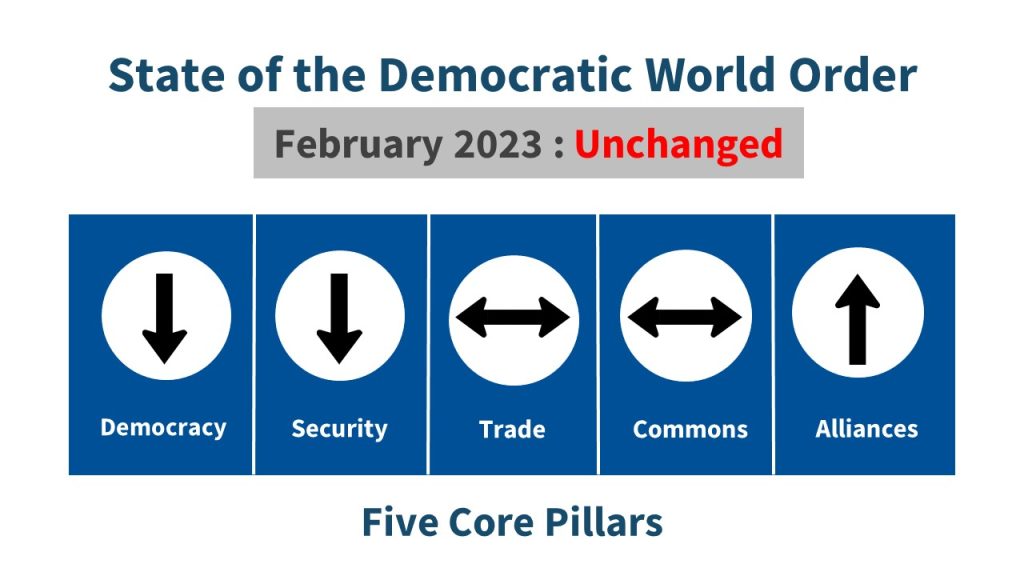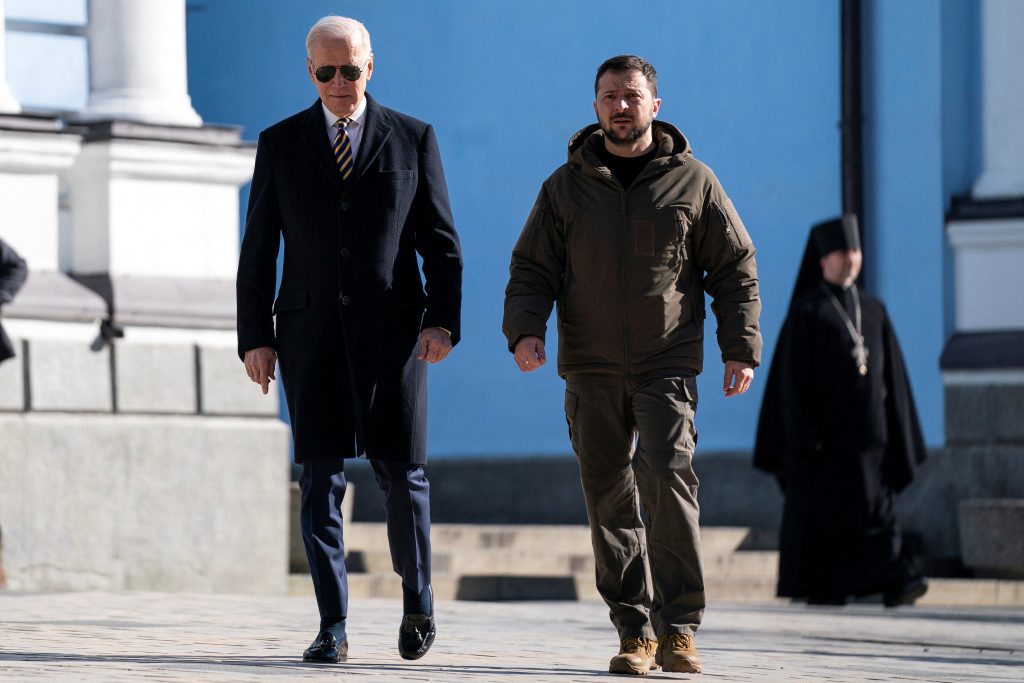Reshaping the order
This month’s topline events
Biden Goes to Ukraine. Days ahead of the one-year anniversary of Russia’s full-scale invasion of Ukraine, President Joe Biden made an unannounced visit to Kyiv to meet with Ukrainian President Volodymyr Zelensky. While expressing gratitude for US and allied support, Zelensky appealed for heavier weapons, including fighter jets and long-range missiles that could help drive Russian forces back. On the battlefield, Ukrainian forces held their ground as Russia launched a new offensive in the Donbas.
- Shaping the order. Biden’s high-risk visit signaled America’s resolve to stand with Ukraine and maintain military support for as long as necessary, as the war extends into its second year. The administration has framed the conflict as a battle between democracy versus autocracy and a struggle to uphold a rules-based order. If Putin succeeds in Ukraine, Russia and other revisionist autocracies may be emboldened to commit aggression or engage in coercion against other nations.
- Hitting home. Despite the prolonged conflict, recent polling indicates that a substantial majority of Americans continue to favor US support for Ukraine’s war effort.
- What to do. While coordinating closely with allies, the Biden administration should give Ukraine the weapons it needs to win the war, including seriously considering Zelensky’s request for fighter jets and longer-range weapons.
China-Russia War Aid. Amid intelligence reports indicating that China is considering the provision of lethal weapons to support Russia’s war effort in Ukraine, US Secretary of State Antony Blinken warned that there would be “serious consequences” if Beijing moves forward on this front. US officials revealed that China is already providing non-lethal military assistance to Russia. The US began consulting with G7 allies to impose sanctions if Beijing were to transfer munitions. China sought to downplay such reports, instead highlighting its newly announced twelve-point peace plan for Ukraine that called for an immediate ceasefire—a proposal dismissed by US and EU officials as a “gimmick.”
- Shaping the order. With Russian forces rapidly depleting ammunition stocks and facing shortages of essential equipment, Chinese military support could provide a critical lifeline for the Kremlin and potentially alter the trajectory of the war. Such a move would also have far-reaching strategic implications, serving to solidify the China-Russia partnership and deepening an “axis of autocracy” aimed at pushing back on the US-led global order.
- Hitting home. Economic sanctions against China could have serious implications for US businesses and the global economy.
- What to do. Washington should continue efforts to deter China from providing lethal aid to Russia, while being prepared to impose coordinated sanctions with allies if Beijing decides to move forward.
US Pops Chinese Balloon. US fighter planes shot down a Chinese spy balloon that had crossed into US sovereign airspace and traveled across the mainland for several days. Despite Beijing’s claims that the balloon was conducting civilian weather research before accidentally veering of course, US intelligence officials assessed that the aircraft was part of a vast surveillance program run by China’s People’s Liberation Army. The incident led to recriminations, as Secretary of State Blinken scuttled a planned trip to Beijing, though he later met China’s top diplomat Wang Li on the sidelines of the Munich Security Conference.
- Shaping the order. While it remains unclear whether China intended to have the balloon fly over US airspace, the incident exacerbated tensions between the US and China. Despite efforts by President Biden and Chinese President Xi Jinping’s to set “guardrails” on their relations since their meeting in Bali last fall, Washington and Beijing appear to be increasingly at odds, as China has become more assertive in threatening Taiwan, strengthening ties with Russia, and challenging the legitimacy of US global leadership.
- Hitting home. The specter of a Chinese spy balloon traveling through US airspace starkly highlighted the potential threats to homeland security posed by China.
- What to do. The US should remain vigilant in defending against potential threats to the homeland from China and other foreign malign actors, while at the same time seeking to establish more consistent lines of communication with Beijing to minimize future risks of escalation.
Quote of the Month
“The democracies of the world have grown stronger, not weaker. The autocrats of the world have grown weaker, not stronger … Democracies of the world will stand guard over freedom today, tomorrow, and forever … There is no higher aspiration than freedom.”
– President Joe Biden, speaking in Warsaw, February 21, 2023

State of the Order this month: Unchanged
Assessing the five core pillars of the democratic world order
Democracy (↓)
- Tunisian police arrested two more prominent opposition leaders in an escalating campaign targeting rivals of President Kais Saied, as Tunisia—once a bright spot for democracy in the Arab world—slid further into autocracy.
- At the urging of Mexican President López Obrador, the Mexican Congress passed a measure to overhaul the country’s independent election agency, triggering large-scale protests as opponents expressed concerns that the move could weaken the country’s democracy by hampering the ability to conduct reliable elections.
- A controversial proposal by Israeli Prime Minister Benjamin Netanyahu to limit the independence of the country’s Supreme Court sparked large protests in Israel and raised concerns among opposition groups, as well as among pro-Israel lawmakers in Washington.
- Nearly twenty years after the US invasion, Iraqi Prime Minister Mohammed Shia’ Al Sudani touted the country’s success in establishing a peaceful democracy, saying that most Iraqis appreciate that the US and its allies came to “save” Iraq from the brutality of Saddam Hussein’s regime and that, despite the heavy toll on the Iraqi population, “it’s much better to have a freedom and democracy rather than a dictatorship.”
- On balance, the democracy pillar was weakened.
Security (↓)
- Marking the one-year anniversary of Russia’s full-scale invasion of Ukraine, Vladimir Putin announced that Russia will suspend cooperation under the 2010 New START Treaty, the last major arms control agreement with the United States that limits each country to 1,550 deployed nuclear warheads.
- China is seriously considering the provision of lethal weapons to support Russia’s war effort in Ukraine, a move that US Secretary of State Antony Blinken warned would have “serious consequences.”
- A Chinese spy balloon that had crossed into US sovereign airspace was shot down by US fighter planes, exacerbating tensions between the US and China.
- China sought to expand security cooperation with partners across the world, as Xi Jinping hosted Belarusian president Alexander Lukashenko and Iranian President Ebrahim Raisi, and Beijing unveiled a Global Security Initiative that calls for expanded training with security forces from other countries.
- Inspectors from the International Atomic Energy Agency reported that Iran has produced enriched uranium particles to the level of 83.7%, reducing the breakout time for producing one bomb’s worth of weapons-grade uranium to about twelve days if it were to move forward.
- The US and the Philippines announced an agreement to provide US forces access to four new military bases in the country, as part of a US effort to expand its strategic footprint across the Indo-Pacific.
- On balance, the security pillar was weakened.
Trade (↔)
- After three years of negotiations, Britain and the EU reached a breakthrough agreement on new trade rules in Northern Island, a move that resolves a simmering dispute following Britain’s exit from the EU.
- On a visit to India, German Chancellor Olaf Scholz discussed with Indian Prime Minister Narendra Modi the contours of a potential new trade deal between India and the EU.
- Overall, the trade pillar was unchanged.
Commons (↔)
- The US Energy Department concluded, based on uncited new evidence, that the COVID-19 virus most likely emanated from a leak from a virology laboratory in Wuhan, a conclusion also reached by the FBI in 2021—though other US intelligence agencies remain divided on the assessment.
- Overall, the global commons pillar was unchanged.
Alliances (↑)
- Vice President Kamala Harris joined the leaders of Britain, France, Germany, the EU, and other nations at the Munich Security Conference to reaffirm their commitment to stand up to Russian aggression in Ukraine. Separately, G7 foreign ministers called for other countries to cease assistance to the Russian military and avoid undermining sanctions measures against Russia.
- Finland will seek to move forward with NATO membership independently from Sweden, whose membership bid remains stalled as Turkey and Hungary continue to delay potential ratification.
- The new basing agreement between the US and the Philippines bolstered their bilateral alliance—one that had soured during the previous presidency of Rodrigo Duterte—as defense ministers from the two nations also discussed a potential military triad with Japan.
- Overall, the alliance pillar was strengthened.
Strengthened (↑)________Unchanged (↔)________Weakened (↓)
What is the democratic world order? Also known as the liberal order, the rules-based order, or simply the free world, the democratic world order encompasses the rules, norms, alliances, and institutions created and supported by leading democracies over the past seven decades to foster security, democracy, prosperity, and a healthy planet.
This month’s top reads
Three must-read commentaries on the democratic order
- Samantha Power, in a Foreign Affairs piece titled “How Democracy Can Win,” asserts that autocrats are on the backfoot, and the United States and other democracies have an opportunity to regain momentum in their efforts to counter authoritarianism.
- Timothy McLaughlin, in The Atlantic, contends that the US must reorient its Indo-Pacific strategy from building military agreements to crafting strong economic policies with allies in the region.
- Paul Poast argues that, through their recent actions, democracies in the BRICS—Brazil, India, and South Africa—are lending support to Moscow and effectively aiding and abetting Russia’s war in Ukraine.
Action and analysis by the Atlantic Council
Our experts weigh in on this month’s events
- Fred Kempe, in Inflection Points, argues that, in the wake of President Biden’s visit to Kyiv, the US needs to double down on its support to ensure Russia is strategically defeated and the West remains united.
- Dan Fried and Brian O’Toole, in the New Atlanticist, outline the effect of sanctions against Russia but note that a victory in Ukraine will require more than economic tools.
- Patrick Quirk and Katya Rimkunas, in The National Interest, discuss how the US should approach the upcoming Summit for Democracy, particularly in regards to support for democratic institutions and political parties.
__________________________________________________
The Democratic Order Initiative is an Atlantic Council initiative aimed at reenergizing American global leadership and strengthening cooperation among the world’s democracies in support of a rules-based democratic order. Sign on to the Council’s Declaration of Principles for Freedom, Prosperity, and Peace by clicking here.
Ash Jain – Director for Democratic Order
Dan Fried – Distinguished Fellow
Sydney Sherry – Project Assistant
If you would like to be added to our email list for future publications and events, or to learn more about the Democratic Order Initiative, please email AJain@atlanticcouncil.org.
Image: U.S. President Joe Biden walks with Ukrainian President Volodymyr Zelenskiy at St. Michael's Golden-Domed Cathedral during an unannounced visit, in Kyiv, Ukraine, Monday, Feb. 20, 2023. Evan Vucci/Pool via REUTERS
